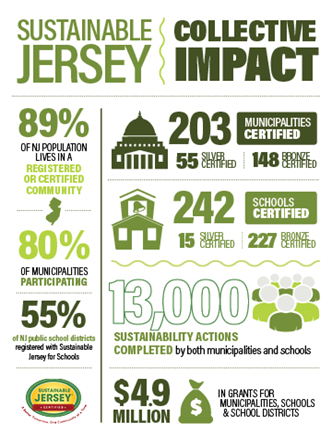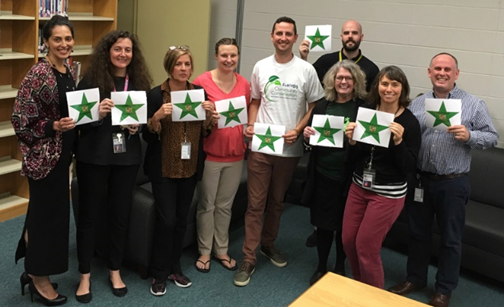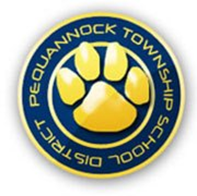- NJASA
- Community Corner June 2019


-
New Jersey School Districts Incorporate Sustainability into Annual Goals
 Over 55 percent of New Jersey school districts are participating in Sustainable Jersey for Schools, a program that provides tools, training and financial incentives to support school leaders as they pursue sustainability initiatives. From energy audits to integrating sustainability into student learning to boosting recycling efforts, over 3,900 sustainability actions were completed by schools and districts that have achieved certification with the Sustainable Jersey for Schools program.
Over 55 percent of New Jersey school districts are participating in Sustainable Jersey for Schools, a program that provides tools, training and financial incentives to support school leaders as they pursue sustainability initiatives. From energy audits to integrating sustainability into student learning to boosting recycling efforts, over 3,900 sustainability actions were completed by schools and districts that have achieved certification with the Sustainable Jersey for Schools program.Increasingly, New Jersey school administrators are incorporating sustainability into their annual goals. The Sustainable Jersey for Schools certification program features best practices and resources that support the quality implementation of these goals. "Participation in Sustainable Jersey for Schools helped us identify, set and achieve our district sustainability goals,” said Thomas A. Smith, Ed.D., the Hopewell Valley Regional School District Superintendent of Schools. He explained, “The program’s format and guidance provide an excellent framework for us to access our progress and identify our areas for growth." The New Jersey 2019 Superintendent of the Year, Dr. Michael Salvatore from Long Branch School District, was selected as a Sustainable Jersey Hero in June 2018 for leading all nine district schools to bronze and silver certifications. “Our schools live and breathe green,” said Dr. Salvatore. “We achieve this by incorporating sustainable principles into our teaching, learning, thoughts and actions.”
There are 91 Sustainable Jersey for Schools certification actions within 19 categories. The program’s wide definition of sustainability encompasses three interrelated components: 1) People: contribute to a strong civil society that provides opportunity for all, 2) Prosperity: support local economies and wise use of community resources and 3) Planet: practice responsible environmental management and conservation. Rather than compete with other certification programs and school-based initiatives, these actions complement them and fit well within many school districts’ yearly goals. Participation is not another flash in the pan program to pursue, but rather an umbrella that serves as a road map for organizing goals and planning for progress.
For each Sustainable Jersey for School’s certification action, there is an explanation of how to implement the action, why it is important, and if there is a cost involved. There are also examples of New Jersey schools that have achieved it. School districts that have improved communication, often earn points for the Accessible Communications action. For schools and districts working to improve community connection; popular actions include: School Community Asset Mapping, Community Outreach and Education or the Civic & Stewardship Volunteer Initiatives. For strategies to boost professional development, there is the action for Professional Development for Sustainability and iSTEAM Professional Development Plan. Integrating SEL into classroom and overall school environment is mapped out by the Social Emotional Learning Integrated Unit, School Culture & Climate Needs Assessment and Inclusive Environments Where All Can Thrive actions.
Hopewell Valley Regional School District (Mercer County)
 In 2016, the Hopewell Valley Regional School District made “District Sustainability” one of its five district goals. Since then, the school district has incorporated a number of important sustainability policies that drive their sustainability program while helping their schools achieve certification. Four of the six schools in the Hopewell Valley Regional School District have achieved Sustainable Jersey for Schools certification. The four bronze certified schools are Bear Tavern Elementary School, Central High School, Hopewell Elementary School and Timberlane Middle School.
In 2016, the Hopewell Valley Regional School District made “District Sustainability” one of its five district goals. Since then, the school district has incorporated a number of important sustainability policies that drive their sustainability program while helping their schools achieve certification. Four of the six schools in the Hopewell Valley Regional School District have achieved Sustainable Jersey for Schools certification. The four bronze certified schools are Bear Tavern Elementary School, Central High School, Hopewell Elementary School and Timberlane Middle School.For the 2018-2019 school year, Hopewell Valley Regional School District made “Sustainability and Green School Efforts” one of six areas of focus. Thomas A. Smith, Ed.D., the Superintendent of Schools, explained, “Reducing our carbon footprint remains an area of focus. In addition to the installation of high-efficiency lighting and HVAC units, we have partnered with the Friends of Hopewell Valley Open Space to expand our outdoor classrooms and plant meadows that require minimal maintenance. We are also trying to recognize students and staff who are making a difference through our Eco Warrior program. As we work to eliminate plastic straws in our cafeterias, we will also be encouraging students to reduce the use of single-use plastics such as bottled water. To date, we have installed over 70 filtered bottle filling stations in our schools.”
Pequannock Township Schools (Morris County)
 Completed in 2016, the Pequannock Township School District’s Strategic Plan for 2016-2021 outlines the community’s vision, mission, goal areas and actions through 2021. In 2017, the Pequannock Township School District leadership, building on the foundation of the Strategic Plan, adopted two impressive district sustainability policies: 7461 District Sustainability Policy and 8429 Environmentally Sustainable Practices. These policies provide guidance and a commitment to sustainable practices by the Board of Education. Dr. Brett Charleston, Superintendent of Schools, said, “The Pequannock Township School District recognizes the critical importance of environmental sustainability and as a community we are committed to fostering the principles of environmental, economic and social stewardship through the incorporation of sustainable practices throughout the school district.”
Completed in 2016, the Pequannock Township School District’s Strategic Plan for 2016-2021 outlines the community’s vision, mission, goal areas and actions through 2021. In 2017, the Pequannock Township School District leadership, building on the foundation of the Strategic Plan, adopted two impressive district sustainability policies: 7461 District Sustainability Policy and 8429 Environmentally Sustainable Practices. These policies provide guidance and a commitment to sustainable practices by the Board of Education. Dr. Brett Charleston, Superintendent of Schools, said, “The Pequannock Township School District recognizes the critical importance of environmental sustainability and as a community we are committed to fostering the principles of environmental, economic and social stewardship through the incorporation of sustainable practices throughout the school district.”Each of the five schools in the District established green teams and wellness councils and started work on sustainable environmental practices and staff and student wellness. The green teams made excellent progress, and by 2018, five schools in the district achieved Sustainable Jersey for Schools certification: Hillview Elementary School, North Boulevard Elementary School, Pequannock Township High School, Pequannock Valley Middle School and Stephen J. Gerace Elementary School. For the 2018-2019 school year, the Pequannock Township School District included “Sustainability and Wellness” as one of its five district goals. Currently, the district is working to expand learning opportunities to students about sustainability while working with them on social and emotional wellness.
Dr. Rosalie Winning, Assistant District Superintendent and Co-Chair of the District Green Team explained, “The Sustainable Jersey for Schools certification program supported our existing work and helped us implement sustainability policies. For example, we now encourage new construction and modernization align to LEED certification, minimize the amount of school waste sent to landfills and heighten awareness about the importance of environmental sustainability through curriculum and environmental programs and initiatives. This will have an impact on the community and through sustainability, we are committed to ensuring that the Pequannock Panther community leaves a positive environmental pawprint.”

